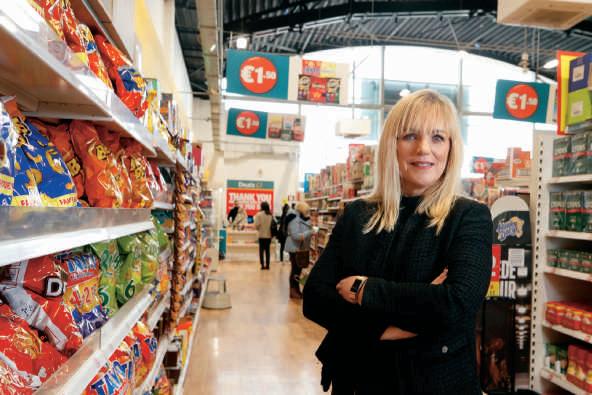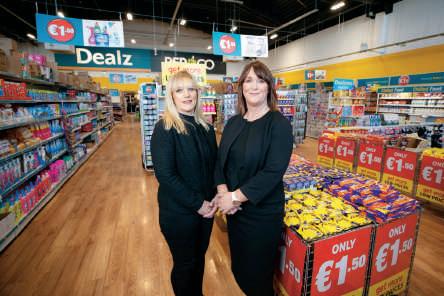
23 minute read
HR
CAROLINE MCENERY managing director, The HR Suite
There are many different types of grief which can affect the workplace. One such form is ‘anticipatory’ grief, which occurs when a loss or sense of doom is expected in the foreseeable future
CONTACT THE HR SUITE:
If you require further information or advice on HR, please do not hesitate to contact The HR Suite’s consultants on (01) 9014335 or (066) 7102887 or email the company at info@thehrsuiteonline.com.
Grief in the workplace during Covid-19
While we normally associate grief with the loss of a loved one, many are currently experiencing a different form due to the Covid-19 crisis, stemming from a loss of normality. Here, The HR Suite’s Caroline McEnery explains how best to support employees through these challenging times
In the ‘pre covid-19’ world, we would normally associate of all frontline retail staff, particularly the efforts and grief with the loss of somebody who we are close to such commitment of the grocery retail sector. These employees as a family member, neighbour, friend or work colleague. have been praised for their consistent service to customers In general, grief is experienced by everyone at some point throughout the crisis. Since the phased reopening of other in their lives and we all grieve differently. During the global retail outlets in the sector, more retail staff have returned lockdown, many have experienced a less familiar sense of grief to put themselves in the frontline. It is important that while all around the world. As described above, there is the grief most there are clear guidelines for employers on the ‘return to of us are familiar with when we lose someone close and are work safely’ protocol, that managers and employers also bereaved. However, it could be said there maintain regular check-ins with employees to protect their is a further, different sense of grief which wellbeing. many are now experiencing due to the loss of our sense of normality and freedom Define entitlements and supports that we once knew. In addition to the company bereavement policy, it is Despite the easing of restrictions in necessary to recognise the other forms of grief which recent weeks, our sense of normality many are experiencing due to the coronavirus pandemic. from a pre-Covid world seems a distant There are many useful supports which can be offered memory. Many people describe a sense to employees by using a proactive approach. It helps to of loss due to being unable to connect clearly define employee entitlements and supports. While with family and other social aspects of compassionate leave is not legislatively required, many their lives. While many business owners employers offer it as a gesture of goodwill. and employers battle to stay afloat, it is In general, it is good to operate an open-door policy with important to allocate time and resources employees to discuss work-related or personal problems towards the wellbeing of employees. There are many wellbeing which must always be treated in the strictest confidence. It initiatives available to employees in the workplace, however, is important, as management, to be of as much assistance these may only treat symptoms of poor mental wellbeing. as possible in allaying the fears of employees. Employers Therefore, it is important that grief is identified and treated and managers should make time for employees in this appropriately. It is essential that organisations manage grief as regard and listen sympathetically. These issues often compassionately as possible. affect employee performance when not addressed and
Many types of grief
subsequently also affect the business.
There are many types of grief and as a manager it is important Employee assistance programme to try to understand grief and how it affects the workplace. An ‘employee assistance programme’ (EAP) is a proactive ‘Anticipatory’ grief occurs when a loss or sense of doom is support programme with the objectives of supporting expected in the foreseeable future. Following on from this, employees whose health or wellbeing is being adversely ‘normal’ grief begins soon after the loss occurs and the person affected and is recommended for implementation in the tries to identify ways to learn to accept the loss and continue ‘return to work safely’ protocol. It gives confidential access their normal routine and daily tasks. A further form of grief is to a free, non-judgmental resource that can potentially ‘complicated’ grief. This experience lasts significantly longer reduce stress and help to function normally. The EAP than other forms of grief and can seriously affect a person’s allows employees to avail of a range of professionals to help ability to function and complete the most basic tasks. When with any issues that may arise including grief. this type of grief is experienced, it often requires medical While “we come together by staying apart”, it is intervention in the form of mental health support which important to be more aware of the present moment, needs to be maintained over a period of time until the person including our thoughts and feelings, our bodies and the can resume the normal routine of everyday life. It is ongoing world around us. If we eat well and exercise regularly, it can and important that the wellbeing of the person is monitored positively change the way people feel about life and how we regularly and that they feel supported. Finally, ‘delayed’ grief is approach challenges; even in this challenge which is one of when a reaction to the loss occurs at a later time. This can be the most difficult we will ever face. Therefore, it is vital that brought on by another significant life event or by something we all stay positive, be kind and support ourselves and each unrelated. It can present itself in any of the other forms of grief other through the grieving process. described above. If you require further information, please do not hesitate
The media has recently highlighted the heroic efforts to contact The HR Suite on (066)7102887. n
BARRY WHELAN
managing director of Excel Recruitment
www.excelrecruitment.com
While the old adage that ‘everybody eats’ has protected the grocery trade from the worst ravages of the economic fallout wrought by Covid-19, Barry Whelan of Excel Recruitment, reflects on how our industry’s resilience actually runs a lot deeper
As the Coronavirus pandemic wreaked havoc on both the local and global job markets, leaving many unemployed, furloughed or working reduced hours as employers implemented sweeping cost-cutting measures and forced closures, I think most of us either working in or supplying to the grocery trade, felt blessed to have taken a career path that involved food and food retail.
The age-old adage ‘everybody eats’ really made sense as we saw businesses that had survived the last recession forced to close such as hairdressers and of course pubs and restaurants, while supermarkets, convenience stores and petrol stations remained open for business.
Industry resilience
The resilience of the grocery trade to recession and economic shocks, even those created by a pandemic, is heartening for those of us who work in the industry and attractive to jobseekers who want to join an industry that survived these most challenging times.
I think resilience isn’t just driven by the fact that people have to eat every day. We will always have customers because of this, but I believe the resilience comes from deeper factors that include how well run the grocery trade is and how competitive the market is.
Coping with panic buying
Firstly, a great example of how the grocery retail trade in Ireland is extremely well run, is when we look to the start of the pandemic and the panic buying that took place across the country. Each player in the industry, whether they are a multiple, discounter or symbol, had to contend with this phenomenon, which came completely out of leftfield. Across the world, consumers really

Despite frenzied panic buying at the onset of the Covid-19 crisis, “the supply chains held, the distribution centres ran, the trucks rolled and the store staff, management and of course suppliers worked tirelessly to restock shelves,” writes Barry Whelan
panicked, stripping stores of food and work, mostly with customers who commodities, leaving empty toilet appreciated that we had done so. roll sections, pasta shelves and home Competition in the trade had baking isles. Later in the crisis, as the created diversification and some of meat factories recorded outbreaks, our larger retailers had embraced freezers were filled with beef, lamb online shopping. These retailers had and pork. No buyer or planner or to cope with unprecedented demand supermarket manager, no matter on this part of their business, using how much of a genius they are, could stores as distribution centres, with forecast what would be the next item staff having to stock and then to undergo a frenzied uplift. Who unstock the shelves themselves to knew the entire population of Ireland fulfil ecommerce orders. Businesses would don their aprons and go all prioritised at-risk customers and Mary Berry on us! got on top of demand as fast as
Despite all this random, frenzied possible, managing a complex and buying, the supply chains held, the unprofitable part of their business to distribution centres ran, the trucks maximum effect, delivering needed rolled and the store staff, management groceries to those most affected and of course suppliers worked by the pandemic. Retailers need tirelessly to restock shelves and to be commended for their efforts alleviate the panic that had engulfed here both in food and non-food the Irish and indeed worldwide ecommerce, another great example consumer. of how well our retailers are run. Never has there been a better Maintaining normality time to shine a light on careers in Retail workers were propelled to food retail. The Covid-19 crisis has frontline employee status and thanked shown that food retail and those on billboards around the country. who supply into it, are resilient to As the majority of the population sat economic shock, populated with at home growing out their hair and extremely well-run businesses beards and probably drinking too that are robust and can cope much, we got to stay in normality, with change. This is truly a great getting up each day and going to industry to enjoy a career in. n
Dealz of the day

With Dealz having just opened three new stores in Ireland, the ambition of its recently appointed co-leaders is evident. Gillian Hamill caught up with Sharon Sheridan, country manager – trading, and Olivia McLoughlin, country manager – retail, to hear how together they navigated the challenges of Covid-19 to emerge ‘stronger and better’, which fittingly enough, is the group’s hashtag
Despite the challenges posed by lockdown, discount retailer Dealz is thriving. As ShelfLife headed to print, the retailer had just opened three new stores in Ireland, bringing its total portfolio here to an impressive 100 stores. Located in Rathfarnham in Dublin, Clonakilty in Cork and Buncrana in Donegal, the new stores which opened on 16 July, are expected to create over 75 new jobs with an investment of £1 million into the local Irish economy. A vital development, given that Ireland’s unemployment is expected to rise to 7.5% this year. The group is also carving out a strong presence in the Dublin market, with the latest opening in Rathfarnham Shopping Centre its 16th Dublin store. Taking over the lease from previous tenant Penneys, Dealz is on a mission to bring back discount fashion with its Pep&Co clothing range after local shoppers were “left high and dry” following Penneys’ withdrawal.
Ambition to grow
In March of this year, Dealz and Poundland officially announced that two Irish women were taking leading roles as part of a new structure for the business across the Republic of Ireland and Northern Ireland. Namely, Sharon Sheridan, who was appointed ‘country manager – trading’, and Olivia McLoughlin, who was named ‘country manager – retail’. Now, the latest openings are a clear signal of this dynamic duo’s ambition. As Olivia McLoughlin puts it: “We’re thrilled to open three new Irish stores on the same day – it’s a signal of our ambition to grow. Customers have fallen in love with the wider ranges at Dealz during lockdown – we stayed open and proudly delivered our promise of amazing value, despite the circumstances.”
It’s hard not to resort to the somewhatcliched phrase ‘baptism of fire’ in this scenario, given the incredibly short space of time that had lapsed between the date of the press release detailing Sheridan and McLoughlin’s appointments and the onset of the Covid-19 crisis. Nevertheless, Dealz was ideally placed to make the most of the lockdown-inspired
Keeping prices low across the board is paramount at Dealz, where Sharon Sheridan says, “we will discontinue a product rather than put the price up for the customer”
trend for all things self-improvement, with a healthy uptick in areas such as gardening, homeware and health & beauty. In fact, by May, Dealz had already observed a surge in weekly sales of home treatments since the first week of lockdown. Hair removal creams were up a staggering 3,183% and body wax strips up 425%. What’s more, weekly sales of €1.50 pregnancy tests were up by 25% since the first week of lockdown! Increases which helped offset the decimation of on-the-go sandwich sales.

Yin and yang
Unsurprisingly, ShelfLife had plenty to discuss during our interview which took place via the ‘new normal’ medium du jour, the Zoom video conference call. Fortunately, Sheridan explained that the joint leadership had been in place since the beginning of January, so the time scale was not quite so severe as we initially imagined. Of the two women’s partnership, she tells us: “We’re very similar in lots of ways but very different in others. I would say she’s the yin to my yang! The two of us are very much on the same page. I was actually on holidays when all of this happened. I got back and the first person I rang was Olivia and I said: ‘Oh my god, what are we going to do?’ She said: ‘Together, we’re going to keep these shops open and trade them as best we can’.”
Without a doubt, sheer shock would have been the initial reaction of every retailer – and indeed every business – across Ireland, when faced with a challenge of the magnitude of Covid-19. Olivia McLoughlin is in full agreement that having a co-leader and sounding board to talk through the imminent necessary changes was an immeasurable asset. “The benefit of having the co-leadership piece was massive,” she says, “because certainly, it has been very difficult for all retailers. We’re in a brilliant position where we have been able to stay open,” but nevertheless, having a partner with whom to make joint decisions, removed a huge burden. “Both of us were able to make those decisions, which are life-changing decisions for colleagues that we’re talking about, [the possibility of having to] furlough them or close their stores. It’s been amazing to have the advantage of myself and Sharon being able to have those conversations together because it takes on some of that massive responsibility that you have about how you’re impacting people’s lives. Fortunately, we have been fully aligned and in Dealz, we haven’t had to furlough one single colleague which has been amazing.”
Store hibernations
This is despite the fact three stores were temporarily closed, or “hibernated” as industry parlance would have it, during lockdown. Namely, Mary Street in Dublin, Fairgreen Shopping Centre in Mullingar and Merchant’s Quay in Cork. “We obviously discussed it with all of our teams,” says McLoughlin. “We went through a full closure process with them and then every member of management and every colleague in those stores was given the opportunity to firstly, work in the local stores, because most of them were dual-sited so obviously Mary Street has Liffey Street,

Sharon Sheridan is responsible for all trading decisions, including buying, merchandising and supply chain. She had previously led trading in the Republic of Ireland at Dealz for the past seven years
Merchant’s Quay has Grand Parade and then Fairgreen has Pearse Street as well. However, the reality was that some of the staff actually had closer stores to where they lived so we accommodated them there as that was the right thing to do. They worked in their local home stores where they have been of huge benefit and support to us through all of this.”
During the hibernation of these three stores, Dealz was able to progress with phase two of the rollout of its simple pricing structure, as it was with a further 18 stores located in shopping centres which were “massively impacted from a footfall and turnover perspective”. The new simple pricing model means that in addition to its core €1.50 price point, Dealz will introduce big brands at a series of simple price points from 75c. The move, which followed a successful trial at the retailer’s leading store in Clarehall, Dublin, allows Dealz “to look after a wider variety of customers’ regular weekly needs at the amazing value they expect”. The simple pricing structure is also reflected in simpler store navigation with new signage and improved store layout that makes the stores easier to shop. The move initially covers shopper favourites in key categories, such as household, health & beauty, grocery, bread and cakes and pet, and brings new choices for customers. Examples include Old El Paso Fajita Kits for €3, fivepack Maggi Noodles for €1.50, Malt O Meal Marshmallow Mateys for €2.50 and eight-pack Kelloggs Pop Tarts for €2.50.
Stronger and better
“Our hashtag in all of this,” says McLoughlin, “has been ‘stronger and better’ so we’ve looked at every single opportunity where we can come out of this and take the learning from it to be stronger and better.” Implementing phase two in the chosen stores “was a simpler task for the colleagues,” she adds, “because they had some of that downtime. It’s brilliant from a customer perspective that we have been able to progress

with some of that simpler pricing and hopefully by the end of this year - it will take until the end of this year - we will have every store finalised.”
Meanwhile, keeping prices low, even in the midst of a pandemic, appears to be a genuine source of pride for team. “The biggest thing that our customers have loved,” says McLoughlin, “and it’s been very evident when you look at some of the comments around our competition on social media, is that we haven’t increased one price. As Sharon has said, you are probably getting more value now because you’re getting bigger quantities for the same price. Without speaking specifically about any of our competition, but as a mam going into stores,” she continues, ”when you see things like wipes that were a relatively low price that have quadrupled in price overnight in some of our competition, it’s a bad thing to take advantage of that situation and we were adamant that we never would and we haven’t done, nor would we ever in the future and that’s been great for our customers.”
“We don’t do high-low pricing,” Sheridan nods. “We’re in a place that if it comes to it, if we have to make the decision, we will discontinue a product rather than put the price up for the customer and we will look for something that will be as good for the customer in that area; that’s the way we’ve always traded Dealz here in Ireland.”
Securing deals
Indeed, the huge soar in demand for products such as hand sanitiser has demanded buyers think outside the box. “Both myself and our colleagues in the UK team went out scouring,” says Sheridan, “seeing what we could get from our current supply base and then what we could get from anywhere else, while making sure that we’re working with legal [regulations], that the product is suitable for sale.” The result? “We have a lot of new suppliers that we’ve taken on board,” she says, “and a lot of our current suppliers, particularly in the UK that would be a part of our parent business, they’re seeing massive increases [in orders] from us. We haven’t put prices up, it’s not part of our strategy to put prices up, so customers are confident that they can get the product they want at the price it has always been.”
Shopping safely
Not only was it crucial to maintain a value focus, but implementing the right safety measures from the get-go “was a massive piece of work,” McLoughlin adds. This was a new logistical reality that all grocery retailers had to get to grips with incredibly quickly, and Dealz was no different in this regard. Perspex screens

Sharon Sheridan, Dealz country manager – trading and Olivia McLoughlin, Dealz country manager – retail, say they have “proudly delivered our promise of amazing value, despite the circumstances”
and hand sanitiser stations were installed in every store, alongside 2m social distancing, the closure of every second till, compulsory handwashing for staff every 20 minutes, a greeter at every store to maintain shopper limits and of course, the maintenance of hygienic and safe staff spaces, such as canteens and offices.
Beyond these measures, ShelfLife was keen to hear what both women believe will be the long-term impacts of the Covid-19 crisis. “It’s two-fold,” replies McLoughlin. “The shopping patterns of the business will obviously change; people will continue to shop less frequently and go back to doing those bigger shops.”
Local focus
The focus on the local community and colleagues’ interaction with their community is now “phenomenal,” she continues. “We’ve done a lot of things to say thank you to our colleagues. One of them was we gave them a token amount that they can use to buy items for themselves in-store. A big percentage of our colleagues have taken that money and not used it for themselves, but to make up care packs or hampers for their local community and that’s been really different. This [crisis] has made all our stores really feel they are part of a local community, that they are there for their local customers, so for me, there’s been some real upsides. We’ve been able to say to our customers, thanks for shopping with us and here’s a little bit of how we can give back to you.” This includes two occasions where Dealz has implemented a ‘buy one, give one’ initiative, whereby when customers bought one item such as an Easter egg, Dealz donated another to charity on their behalf.
Exceptional talent
With Dealz still in expansion mode moreover, it hasn’t had to hit pause on hiring the best talent available. “In some incidences, we have hired some colleagues that we know we will need in the future,” says McLoughlin. “We have also taken on some managers that will fit into our model, even up to the point where we’ve hired a new area manager designate within Ireland as well, so we have definitely looked at the opportunity as some other retailers have closed their stores, such as Carphone Warehouse, where there has been exceptional talent we will never miss out on that opportunity to bring that talent into the business, so it never became a thing that we would put a pause on that desire for great talent within our business.” Indeed, McLoughlin herself joined Dealz last October from Dixons Carphone.
“We still have lots of opportunity,” she continues. “We’re still looking at opening more stores to keep the high street alive. The feedback is our local community love us, but they want us even closer to their doorstep, with lots of comments about ‘Oh, can you do online? Can you get nearer to me?’ There’s huge demand there so we want to get into those local towns to service them even more than we did in the past.”
“From a product point of view,” adds Sheridan, “we’ll be looking to increase our till offer because while on-the-go might be a lot less than what it was, people are still coming in and they do want an offer, so we’ll be looking at areas where we’re not as strong at the minute. We’re also looking at an extended range of homeware going forward, entering into higher price points, with items such as fluffy stools and ottomans. We’re looking at putting together ranges like that so we will be that one-stop-shop where people can get everything they want in one place.”
Colleagues have shone
Another point which has come to the fore during this crisis is the importance of good staff. “Sometimes when tough times come, people shirk away from it,” says McLoughlin. “These guys have shone in the toughest of times and we’ve seen the best of our people, for me every one of them are heroes. For us to give them a thank you gift and for them to say we’re going to give it to our local community instead, that’s new, we haven’t seen that type of behaviour for a long time and it’s even more important when we’re going through these struggles, they’ve been phenomenal. Colleagues have got in their cars, filled their boots and driven to local care homes and hospitals with donations. I have stores where not one colleague has self-isolated at all, they have come into work because they said ‘I don’t want to put any additional pressure on my peers’. They’ve done it safely, those without underlying conditions obviously, every one of them has chosen to come into work every single day and that’s testament I suppose to the fact retailers are essential, we are essential workers. Some of our customers come to see us because they don’t talk to other people during the day, they get to talk to us. It’s that lifeline; the big lesson with all of this is that retailers are a lifeline for a lot of people.” n
Recent months have been extremely challenging for communities the length and breadth of Ireland. The Covid 19 crisis has fundamentally changed how we go about our daily lives, interact with one another and how we do our jobs. Once routine, visiting a shop, supermarket or forecourt has become far more complex for every one of us.
Throughout this difficult period, however, frontline retail workers have played a vital role in keeping the country running. It is your hard work and commitment that has kept key businesses open, shelves stocked and ensured essential items remained available to consumers. From delivery drivers to store managers to cashiers, the country will be forever grateful for your efforts. From everyone at JTI Ireland, we would like express our sincere gratitude to you, the country’s frontline retail workers. Your professionalism in difficult circumstances and ability to quickly adapt to strict new working practices has been inspirational, and we have been exceptionally proud to work with you through this unprecedented challenge.

After months of providing remote support, our sales teams have now returned to field operations. Still, we know that things are not quite back to business as usual just yet and there will be difficult times ahead. But rest assured that JTI is there for your business in times of crisis, just as we are in times of progress.










